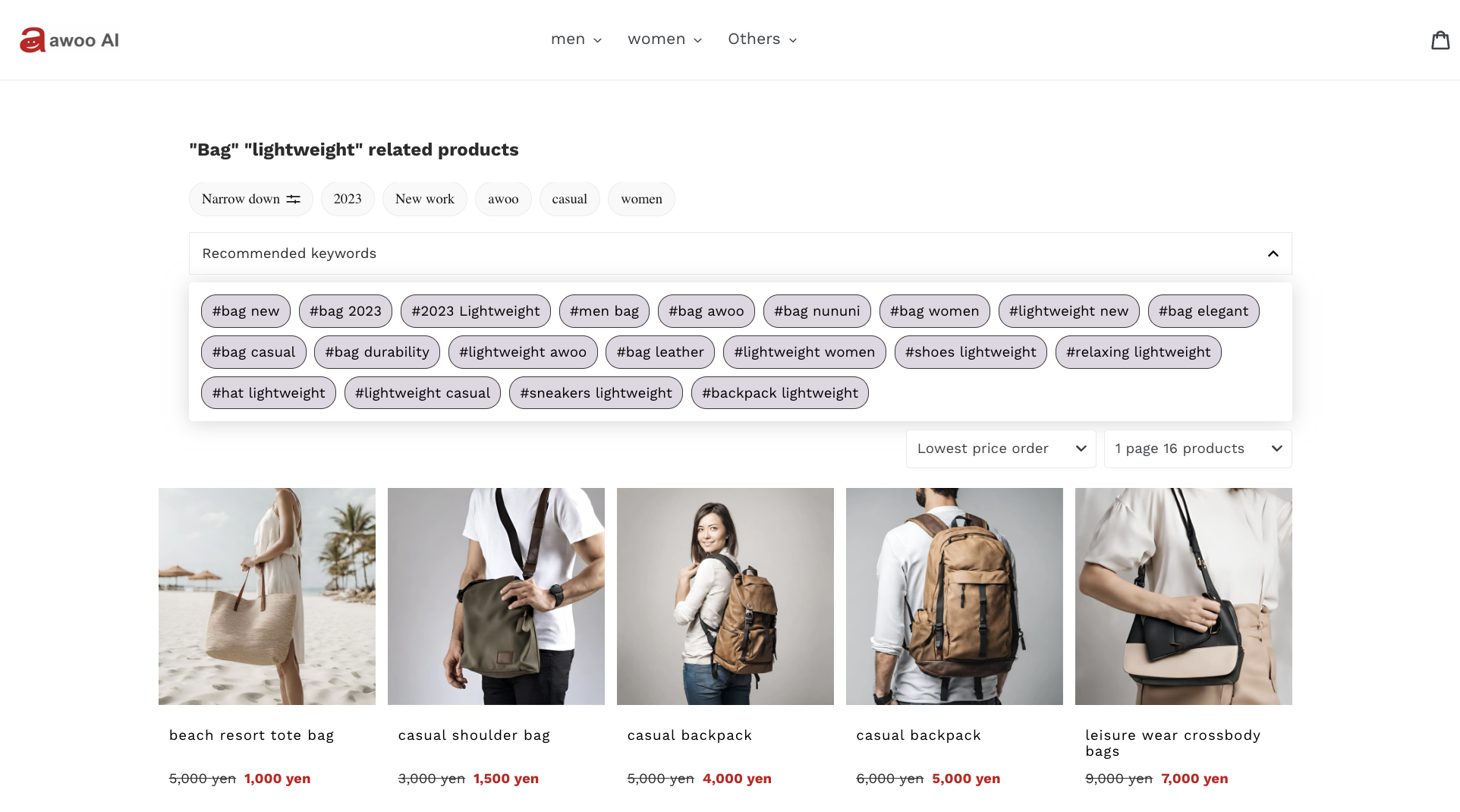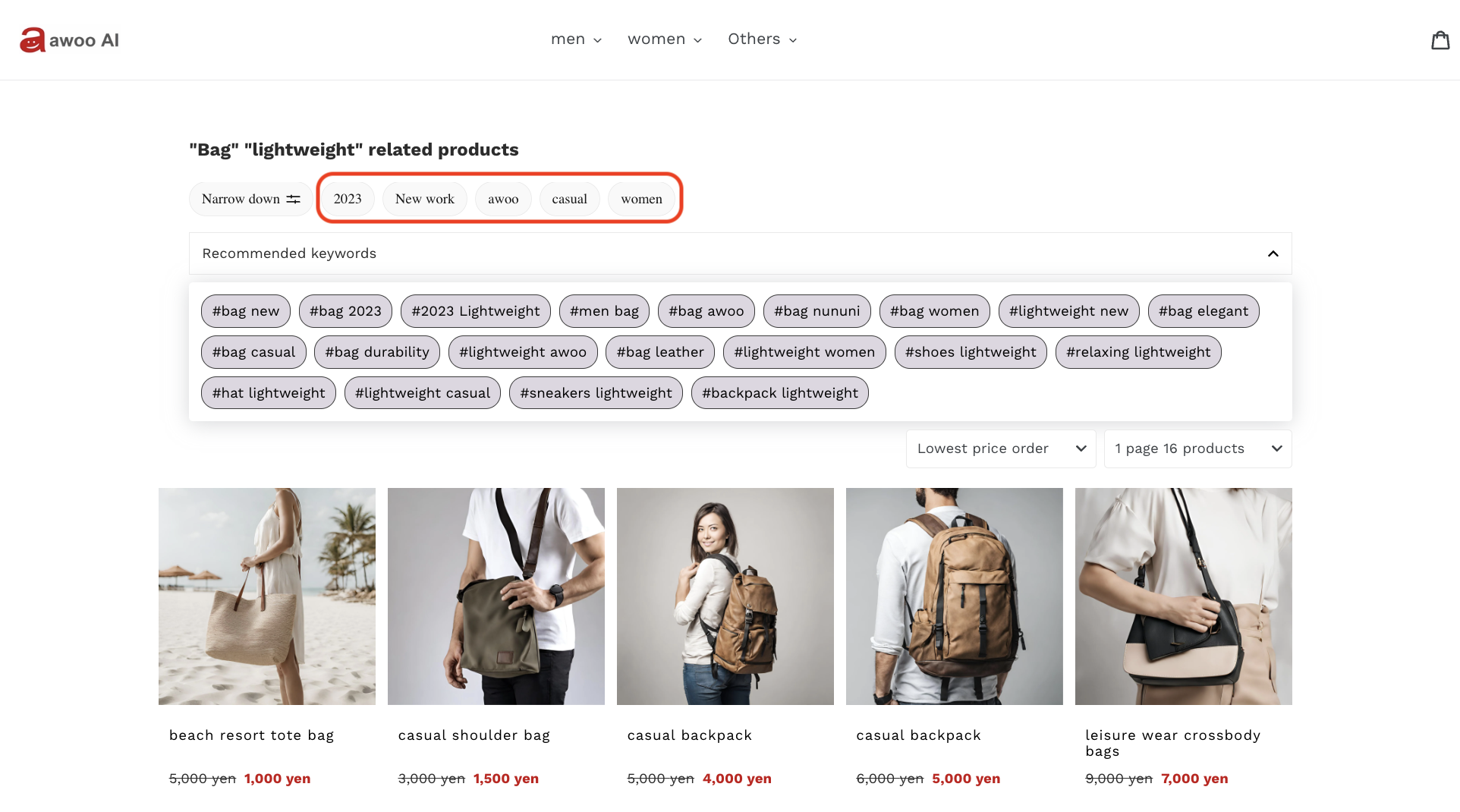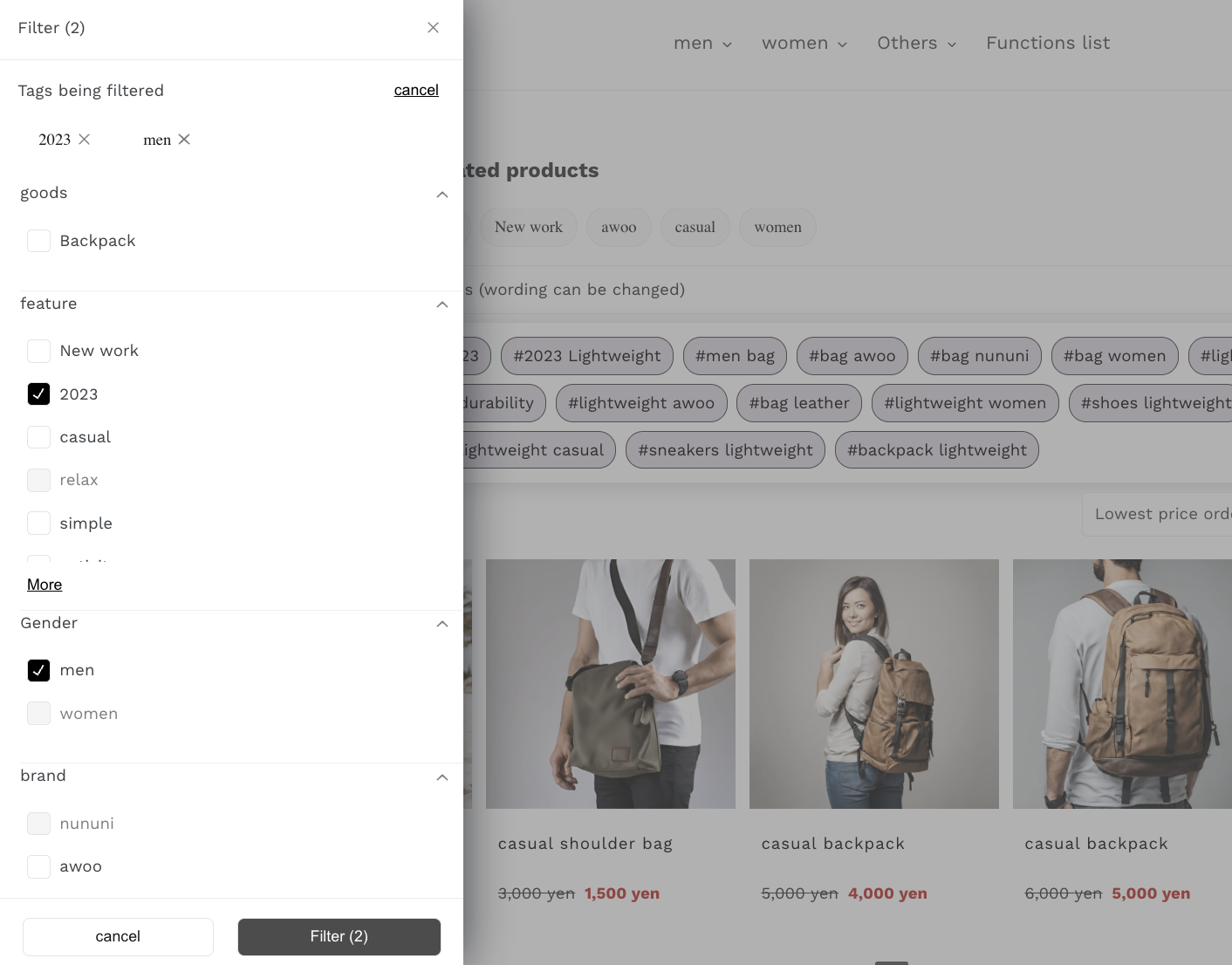awoo Page V2
Advanced powerhouse behind awoo Page
✨ Introduction
As an improvement of previous Page API, Page V2 brings various enhancements to our awoo Page, the AMP functionality that is widely loved by our clients. The latest awoo Page powered by Page V2 not only retains rich information and unique experience that we used to deliever but also provides a powerful Tag Filter to let users better narrow their shopping intent. We can't wait to showcase our flagship functionality to you! Let's dive right in to explore how you can customize your Page V2 API call, and how to utilize the API response.

awoo Page powered by Page V2
When it comes to product availabilityNote that all products will possibly be retrieved by Page API, no matter what kind of availability is specified in the datafeed. The sorting order will be "In stock" > "Out of stock" > "Preorder" > "Backorder". Check awoo Datafeed Specification to properly format your product info.
🎨 Tailor Page V2
Before explaining every parameter that you can customize, let's take a look at the schema of the API request body. It may help you gain clearance on what to specify to make a successful API call.
{
"tags": [
"tag1",
"tag2",
"tag3"
],
"tagFilters": [
{
"literal": "literal_name",
"terms": [
"term1",
"term2"
]
}
],
"page": 1,
"limit": 20,
"sort": 14,
"productType": "category_name"
}⚙️ Specify tags that your customers click on
The most important information to pass in is what your customers are interested in. Usually, their shopping intent is reflected in what tags they are clicking on. Specify the tags with the parameter "tags". You are able to pass in at most 3 tags in a single API call, with a maximum of 50 characters for each. Please note that if you specify pure text, instead of a tag, for the "tags" parameter, you will retrieve an empty API response with status code 200.
⚙️ Filter retrieved products by tag
Different from the specification of previous Page API, you should specify both "literal" and "terms" for parameter "tagFilters" to filter retrieved products by your desired tag. Switch tabs below to see sample value for "tagFilters".
"tagFilters": [
{
"literal": "gender",
"terms": [
"female"
]
}
],"tagFilters": [
{
"literal": "brand",
"terms": [
"awoo",
"nununi"
]
}
],"tagFilters": [
{
"literal": "brand",
"terms": [
"awoo",
"nununi"
]
},
{
"literal": "gender",
"terms": [
"male"
]
}
],⚙️ Determine pagination and limit
With parameters "page" and "limit", you specify the number of products presented on a single awoo Page, and their retrieved order. For example, "limit": 10 means that there will be 10 products presented on page. Combining it with "page": 2 in the request body means that you're presenting the 11th~20th retrieved products on the current page. The default values for "page" and "limit" are 1 & 20 respectively, and you're allowed to retrieve at most 500 products from a single API call. Also, note that page * limit must be less than 10000.
⚙️ Sort the retrieved products
There are multiple ways to sort retrieved products, by specifying the parameter "sort". Please note that the availability of a sorting method depends on whether the required information exists in the datafeed. Check the table below to see all sorting methods:
| value | sorting method | value | sorting method |
|---|---|---|---|
| 1 | Order by final price, ASC. | 12 | Order by release time, DESC. |
| 2 | Order by final price, DESC. | 13 | Order by update time, ASC. |
| 3 | Order by popularity, ASC. | 14 | Order by update time, DESC. |
| 4 | Order by popularity, DESC. | 15 | Order by reviews, ASC. |
| 5 | Order by favorite, ASC. | 16 | Order by reviews, DESC. |
| 6 | Order by favorite, DESC. | 17 | Order by rating, ASC. |
| 7 | Order by salesVolume, ASC. | 18 | Order by rating, DESC. |
| 8 | Order by salesVolume,DESC. | 20 | Order by product create time, ASC. |
| 11 | Order by release time, ASC. | 21 | Order by product create time, DESC. |
⚙️ Filter retrieved products by category
Last but not least, Page V2 also lets you filter retrieved products by category, with parameter "productType". When a category name string is passed in, tags and products that don't belong to that particular category will be filtered out. Please notice that the category name you pass in should have the same format as those specified in the datafeed, and you're only allowed to specify 1 category in an API call.
Advanced Powerhouse for awoo Page!Try Page V2 in the API playground to experience our flagship functionality.
🧰 Utilize API Response
Page V2 not only returns tags and products, but also provides additional info for SEO and tag filter. Let's take a glimpse of the schema of Page V2 response, then we'll explore some highlighted fields below.
{
"errcode": "0",
"errmsg": "ACK",
"requestId": "",
"result": {
"pageInfo": { // essential meta for SEO starts here
"title": "",
"description": "",
"h1": "",
"canonical": "",
"openGraph": {
"title": "",
"description": "",
"siteName": "",
"url": "",
"image": "",
"type": ""
},
"schema": {
"breadcrumbs": {
"@context": "",
"@type": "",
"itemListElement": [
{
"@type": "",
"position":,
"item": {
"@id": "",
"name": ""
}
}
]
}
},
"intro": "" // essential meta for SEO ends here
},
"suggestionTags": [... // retrieved tags here (omitted)
],
"products": [... // retrieved products here (omitted)
],
"productsTotal":, // quantity of retrieved product (omitted)
"tagFilter": {
"type": "Text",
"pinnedItems": [ // field for tag filter
{
"literal": "",
"term": "",
"desktopImageUrl": "",
"mobileImageUrl": "",
"displayOrder":
}
],
"detailItems": [ // field for tag filter
{
"literal": "",
"displayName": "",
"displayOrder":,
"terms": [
{
"term": "",
"displayOrder":
}
]
}
]
}
}
}🪚 pageInfo
By utilizing information returned in the field "pageInfo", you can provide the search engine with metadata about an awoo page. "title" implies the title of the webpage, which you can incorporate dynamic values to create unique and relevant titles for different awoo pages. "description" implies a brief description of the webpage's content, you can also include dynamic values to provide a concise and informative meta. "h1" implies the primary heading of the webpage, which you can, again, use dynamic values to emphasize the main topic of the webpage. Contact your awoo agent to customize those settings with dynamic values.
The field "canonical" helps search engines understand the preferred version of the page when multiple URLs lead to the same content. "openGraph" returns similar metadata as those in the previous paragraph, but are specifically for Open Graph protocol. It's used to enhance how the content appears when webpage are shared on social media platforms. Info within "schema" provides a clear hierarchy and navigation path of webpage for search engines, and makes it easier for them to understand the structure of your website. Finally, "intro" offers a brief introduction to the webpage content.
🪚 tagFilter>pinnedItems
The returned value of field "pinnedItems" specifies tags that you can pin on the upper part of awoo page, to let users better comprehend the attribute/property of shown products and narrow their shopping intent. Those returned "pinnedItems" are determined by (1) your settings on awoo AMP dashboard (check out Tag Filter setting> Label Data setting> Pinned Tag.) (2) the top tagged terms of all the products shown on the page. To put it simply, view it as a tag filter recommendation from our AI engine. Please notice that there'll be at most 5 pinned items returned in a single API call.

pinned tags on awoo Page (circled in red)
🪚 tagFilter>detailItems
The returned values of field "detailItems" specify tag filter options, which you will be able to configure through awoo AMP dashboard (check out Tag Filter setting> Label Data setting> Tag Data.) By default, all literal-term pairs for the tag filter will be disabled, which means an empty return of "detailitems". You should decide what literal-term-pair to present on the tag filter sidebar, and enable those options by yourself. Our system will sort out the intersection between your configuration and the tagged terms of all products shown on page, and set those as the returned value of field "detailitems". To put it simply, view it as tag filter options controlled by yourself.

tag filter specified by "detailItems"
It's Never Too Late to Be Your Turn!Get real Page V2 response in our API playground.
Edited by: Justin Sung
Updated about 2 months ago
